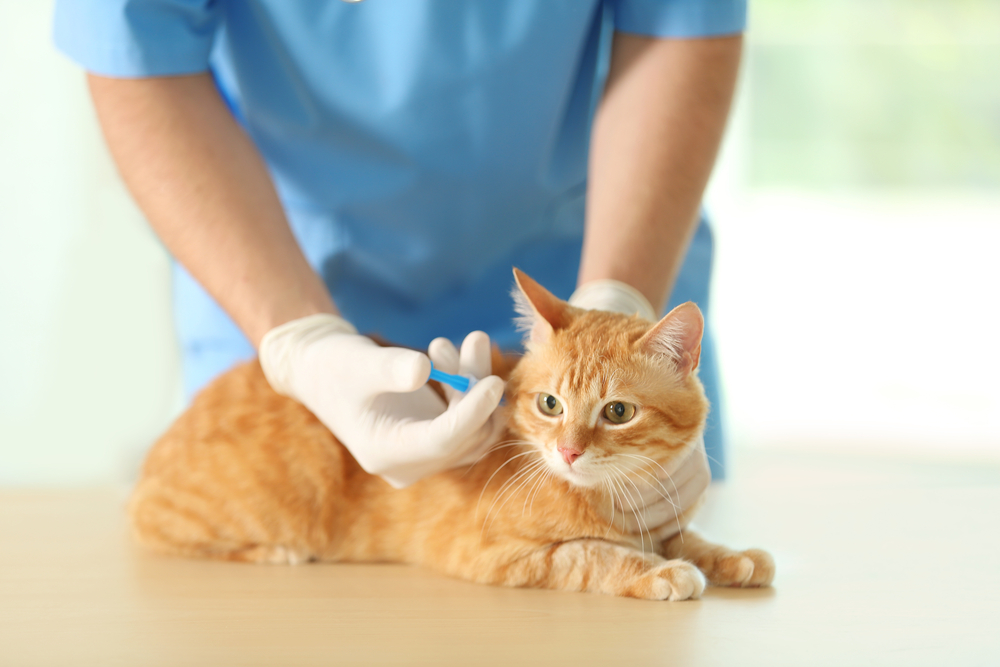Although we can only speculate about the human equivalent of a cat or dog year—whether a year of your pet’s life equals 7 or 70 years—their life span would never be long enough. Dogs and cats live short lives and age much faster than humans—by some measures, a large-breed dog is considered a senior at a mere 6 years of age. Ruh-roh!
Fortunately, you can help lengthen your pet’s abbreviated life span. With thoughtful attention to your pet’s present and future health, you can make a positive impact on their longevity and quality of life. Explore our North Waterloo Veterinary Hospital team’s five pet life-enhancing and potentially life-extending strategies.
#1: Feed your pet a portion-controlled diet
Added calories can subtract years from your pet’s life. According to a 14-year Purina study, dogs who were fed 25% less than the full-fed control group lived 1.8 years longer, maintained a healthier body condition, and experienced fewer age- and development-related health problems. Pet obesity—which affects more than half of the Canadian pet population—is also linked to a pet’s increased risk for chronic life-shortening diseases such as arthritis, cancer, endocrine disorders, and heart disease.
Maintaining your pet’s weight (i.e., a 4 or 5 body condition score) is one of the most basic—yet powerful—steps you can take to enhance your furry pal’s overall wellbeing and longevity. Simple actions, such as asking your North Waterloo Veterinary Hospital veterinarian for healthy pet food recommendations, monitoring your pet’s calorie intake, and meal-feeding—rather than grazing—can transform your four-legged friend’s waistline and improve their long-term health and comfort.
#2: Visit the veterinarian at least once per year
Your pet’s wellness care establishes and supports their lifelong health. When your pet is young, their care includes preventive and protective measures such as vaccinations to strengthen their immune system, nutritional guidance to promote healthy development, spaying and neutering to enhance their health and prevent unwanted litters, parasite screenings and preventives to protect them from anemia, disease, and infestation, and genetic testing to identify and address any inherited conditions.
Compared with puppies or kittens, adult pets may appear to need less veterinary care. However, they need a different type of care. Adult pet visits emphasize ongoing preventive measures (e.g., vaccines, screening tests, blood work), but also include consultations and services for midlife issues such as nutrition, weight management, behavior, lifestyle-based injuries, and dental hygiene.
As your pet reaches their golden years, their care continues to evolve. At senior wellness visits, your veterinarian carefully monitors your pet’s physical wellbeing and their internal functions. Routine blood work helps our North Waterloo Veterinary Hospital team detect subtle changes that can help us diagnose an adverse condition early in the disease process, manage chronic conditions, and improve pet comfort and quality of life. In addition, your veterinarian will customize pain management or therapeutic treatments to maintain your pet’s comfort despite chronic disease (e.g., arthritis, disc disease, cancer).
#3: Keep your pet on year-round parasite prevention

Mosquitoes, fleas, and ticks are a nonnegotiable part of life. However, year-round parasite prevention and annual screening tests can ensure these dangerous pests and the infectious diseases they spread are not your pet’s problem. One bite can cause your pet to experience life-threatening heartworm disease, debilitating tick-borne illnesses (e.g., Lyme disease, anaplasmosis, babesiosis, tularemia, Rocky Mountain spotted fever), or—for hypersensitive pets—flea allergy dermatitis (FAD). Every vector-borne disease creates a long-suffering or life-shortening impact on a pet’s quality of life.
Veterinarian-prescribed parasite preventives are the best way to protect your pet from these preventable life-altering conditions. Although our Canadian winters could cause the Yeti to shiver, our North Waterloo Veterinary Hospital team strongly advises you to continue preventives year-round to avoid coverage gaps and inadvertently missed doses.
#4: Care for your pet’s dental health
Dental disease is a painful and progressive condition that causes oral infection, gingivitis, tooth decay, bone loss, and—ultimately—organ damage. Unfortunately, because early damage occurs below the gumline, the condition is invisible, and many pets suffer in silence until the disease is severe.
At-home dental care and annual oral health exams and professional dentistry services at our North Waterloo Veterinary Hospital can effectively reduce your pet’s plaque and tartar formation, and prevent or slow dental disease progression. By brushing your pet’s teeth at least three times per week and feeding a veterinary dental diet, you help protect your four-legged friend from experiencing unnecessary pain and irreversible damage.
#5: Get moving with your pet
Whether your pet is a land- and water-loving Labrador or an indoor-dwelling Devon rex, regular physical activity and positive social interactions are vital for ensuring their physical and emotional wellbeing. Physical activity and mental stimulation provide your pet with an outlet for their energy, strengthen and enhance their muscle tone, maintain a healthy body weight, improve circulation and metabolism, decrease anxiety and stress, and ensure better behavior.
Aim to provide at least 20 to 30 minutes of heart-rate-elevating physical activity per day for dogs, and at least 15 minutes of activity per day for cats. You can distribute the sessions throughout the day. Motivate reluctant movers by creating an engaging environment that allows them to express their natural behaviors. Provide the following for your pet:
- Scratching posts
- Cat tree for climbing, perching, and hiding
- Dig pit, iDig, or ball pit for dogs
- Crate or a den-like space
- Cozy bed
- Engaging toys
While you understand that your pet cannot live forever, you can make thoughtful choices that ensure your beloved companion lives each day to its fullest, and experiences good health and happiness. Take the first step on your pet’s longevity journey, and schedule an appointment with our North Waterloo Veterinary Hospital team.







Leave A Comment